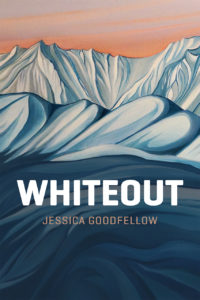by Martha Silano | Contributing Writer
 Whiteout
Whiteout
Jessica Goodfellow
University of Alaska Press, 2017
Jessica Goodfellow’s Whiteout eulogizes the sudden death of the author’s uncle, Steve Taylor, who—along with eleven others—set off on the morning of July 4, 1967, to summit Mount Denali. Seven of the twelve climbers did not survive, including Taylor. While Goodfellow was too young at the time of his death to remember him, the specter of her uncle’s sudden death looms heavily and silently over her. From the very first poem in the collection, “Uncanticle,” (the word uncle is deftly embedded in many of her titles, including “Untraceable,” “Uncleaved,” and “Uncollected”), Goodfellow’s narrative unfolds in a manner that emphasizes the inaccessible, unresolvable aspects of her uncle’s death. Equally as integral to the work, these poems are resonant despite their revelations of inconsolable grief. In the opening poem a fox is described as it walks in the snow,
vanishing behind a rock, to reappear there, by the pine, stitching
his way across the hillside, in and out of our sight line, our knowing.
As she describes its disappearance in the “cold and barely / splintered light,” the reader is introduced to the notion that a person can be literally gone, wiped out without a trace, but that these erasures only serve, paradoxically, to make the missing person more palpably present, as real as when they were alive. As Goodfellow shares in “The Fold,”
My family is silent
about our dead. Hardly
a word about an uncle,
a brother. We children were
to understand that meant:
he was beloved.
Silence as receptacle.
But silence can’t stopper bereavement, that sense that “his nowhere was everywhere. My mother could not look” (“Phantom Pantoum”). Throughout this book, Goodfellow brings her uncle into focus through details that sharpen the experience of his loss. In “My Mother Adds the Name of her Brother, Missing on Denali since 1967, to her Parents’ Headstone,” she laments how “He who never thought to migrate, only wander, / is now not only citizen but mayor of the permafrost.”
Goodfellow’s incorporation of etymologies and use of sound orchestration lend an exquisite beauty to these poems. In “Ever Aftermath,” we learn “The math of aftermath is subtraction— / disaster, catastrophe, ruin: / loss, loss, and loss.” It turns out math derives “from the Old English / for mowing—when aftermath was a second crop // in the same land / as the first brutal harvest.” The term aftermath shifted from a reference to accretion to one of subtraction, which left Goodfellow and her siblings smack dab in the middle of their “family’s silent grief,” like they’d been “added to the scene like sheep / set to graze in the foreground of Stonehenge.” The four alliterative s’s solidify our understanding that, similar to Stonehenge, the uncle’s disappearance is shrouded in mystery and myth. In “A Brief History of Risk,” we learn risk’s origin is less clear, “perhaps from the Greek for soldier’s / fortune, following the Arabic // of that which God allots, / stemming from Middle Persian / for daily bread. Or maybe risk / is from Italian via Latin for cliff …”
Absent the facts, Goodfellow has no choice but to fill in the blanks, as in “Search Party, Called Off,” an achingly gorgeous poem that strives to make peace with the details that will go forever missing:
In the either of ether or ice
he became not himself but his body.
He froze or he fell—in the never
of knowing, we pitch our tents.
We dwell in the hinge of weather
and whether.
Despite having so little to go on, despite knowing “he’d never leave the mountain,” Goodfellow makes a song of what she does know, one detail at a time. In “Map of the Disaster Site,” she starkly states that “his sleeping bag was sighted / but not recovered” and that “X marks the axe—/ also seen but not recovered.” These are hard truths for both writer and reader, but the take-away is that by writing these poems, Goodfellow has brought her uncle’s body home. Her lines re-form the speaker’s pain into sonically-pleasurable riffs:
But in the end a map is useless,
only gravity’s graffiti and snow’s slow pentimento.
Unrepentant map, no X marks the mountain’s fontanel,
its loosely woven selvage he fell through into the legend-
less depths of the wild mind, the memory leaving usonly this permanent impermanence …
I find myself coming back to these poems for repeated readings to marvel at the feat Goodfellow has pulled off. For this is a story not only about an uncle, but about all of us. As she states, in “The Fold”:
Chasm and scaffold,
cornice and crevasse,
the steep pitch of life
and its inverse, its obverse.
Observe, mortals:
the edge. Welcome
to our fold.
Martha Silano is the author of five poetry books, including Gravity Assist (forthcoming March 2019), The Little Office of the Immaculate Conception, and Reckless Lovely, all from Saturnalia Books. She also co-authored, with Kelli Russell Agodon, The Daily Poet: Day-By-Day Prompts For Your Writing Practice. Her poems have appeared in Paris Review, Poetry, and American Poetry Review, among others, and her book reviews can be found online at Kenyon Review, Boston Review, and On the Seawall. Martha teaches at Bellevue College, near her home in Seattle, WA.
